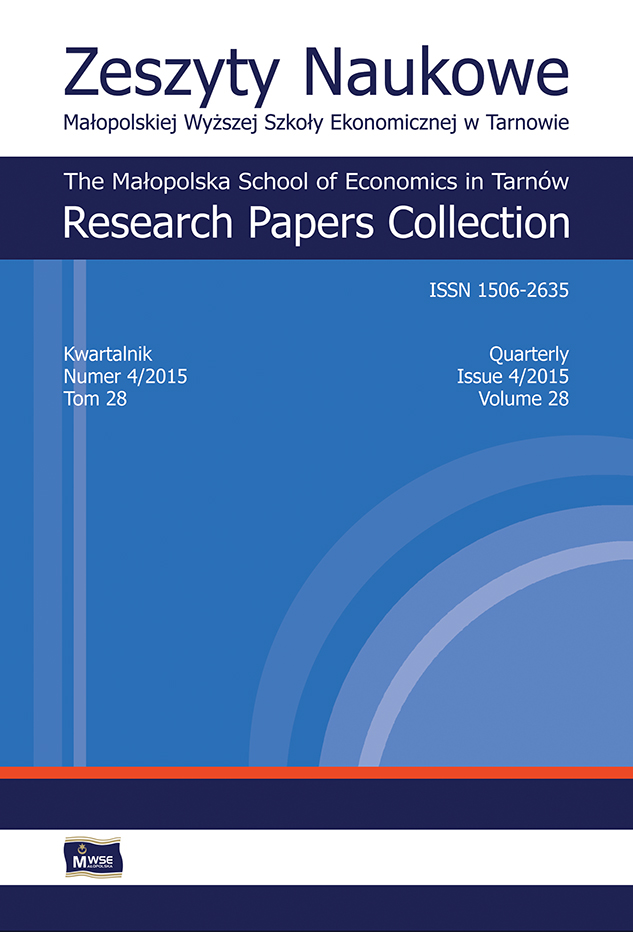Abstract
The paper presents the results of the Polish-American survey focused on the problem of international accounting diversity. A survey was conducted on two undergraduate students groups taught respectively on Polish and U.S. GAAP accounting standards. The results showed that American students consider shareholders and managers as the main users of the financial statements, while Polish students think that tax authorities and managers are the main users. Both groups respect the Income Statement as important core of the financial statements. However, the Americans rely also strongly on the Statement of Stockholders’ Equity, while the Polish prefer more the Balance Sheet as a source of knowledge about the company performance. Moreover, we confirmed that cultural differences led to a different understanding of the word ‘probable’―which is more based according to the taught set of standards on a professional judgment than on the specific probability value. American students turned out to be less prudent in the area of accounting for write-offs. We also revealed that Polish and American students can have different attitudes to ethical issues in auditing―Americans showed more concern. We pointed out that the identified differences can be essential for reporting process by companies and capital groups operating not only on different accounting standards but also in different cultures.
References
Adamek, J. (2011). Kulturowe uwarunkowania krajowych systemów rachunkowości w świetle koncepcji wymiarów subkultury rachunkowości S. Graya, Zeszyty Teoretyczne Rachunkowości, 62(118), 7–22.
View in Google Scholar
Awasthi, V. N., Chow, C. W., Wu, A. (1997). Sensitizing accounting students to cultural diversity: Report on a teaching experiment. Issues in Accounting Education, 12(1), 77–80.
View in Google Scholar
Bednarski, L., Gierusz, J. (eds.). (2001). Rachunkowość międzynarodowa. Warszawa: Polskie Wydawnictwo Ekonomiczne. ISBN 8320813549.
View in Google Scholar
D’Arcy, A. (2001). Accounting classification and the international harmonization debate: On empirical investigation. Accounting, Organizations and Society, 26, 327–349.
View in Google Scholar
Doupnik, T., Perera, H. (2014). International accounting. New York, NY: McGraw-Hill Education. ISBN 9781259252112.
View in Google Scholar
Doupnik, T., Richter, M. (2004). The impact of culture on the interpretation of ‘in context’ verbal probability expressions. Journal of International Accounting Research, 3(1), 1–20.
View in Google Scholar
Górowski, I. (2003). The influence of tax systems on financial reporting. In: M. Dobija (ed.). General accounting theory in statu nascendi: International conference (pp. 515–524). Kraków: Akademia Ekonomiczna w Krakowie. ISBN 8391519635.
View in Google Scholar
Grabiński, K., Kędzior, M., Krasodomska, J. (2013). Globalne uwarunkowania rachunkowości. Systemy, procesy, zmiany. Warszawa: Polskie Wydawnictwo Ekonomiczne. ISBN 9788320821468.
View in Google Scholar
Grabinski, K., Kedzior, M., Krasodomska, J. (2014). The Polish accounting system and IFRS implementation process in the view of empirical research: Accounting and Management Information Systems, 13(2), 281–310.
View in Google Scholar
Gray, S. J. (1988). Towards a theory of cultural influence on the development of accounting system internationally. Abacus, 24, 1–15.
View in Google Scholar
Hofstede, G. (1980). Culture’s consequences: International differences in work-related values. London: Sage.
View in Google Scholar
Hope, O. (2003). Firm level disclosures and the relative roles of culture and legal origin. Journal of International Financial Management and Accounting, 14(3), 218–248.
View in Google Scholar
Jaggi, B., Low, P. (2000). Impact of culture, market forces, and legal system on financial disclosure. International Journal of Accounting, 35 (4), 495–519.
View in Google Scholar
Jaruga, A. (2002). Czynniki kształtujące regulacje rachunkowości w wybranych krajach; analiza przyczyn występujących różnic. In: A. Jaruga (ed.). Międzynarodowe regulacje rachunkowości. Wpływ na rozwiązania krajowe. Warszawa: C.H. Beck. ISBN 8372470073.
View in Google Scholar
Jaruga, A. (ed.). (2002). Międzynarodowe regulacje rachunkowości. Wpływ na rozwiązania krajowe. Warszawa: C.H. Beck. ISBN 8372470073.
View in Google Scholar
Kieso, D., Weygandt, J., Warfield, T. (2001). Intermediate accounting. New York: John Wiley & Sons. ISBN 0471392251.
View in Google Scholar
Klimczak, K. (2013). Wpływ kultury na harmonizację rachunkowości na świecie. Zeszyty Naukowe Uniwersytetu Szczecińskiego, 765. Finanse, Rynki Finansowe, Ubezpieczenia, 61, vol. 2, 119–126.
View in Google Scholar
Koleśnik, K. (2010). Wartości kulturowe a kształt systemów rachunkowości. In: Rachunkowość – wybrane problemy (vol. 4, pp. 105–120). Sopot: Wydział Zarządzania Uniwersytetu Gdańskiego and Fundacja Rozwoju Uniwersytetu Gdańskiego.
View in Google Scholar
Koleśnik, K., Silska-Gembka, S. (2012). Aspekty kulturowe rachunkowości – analiza krajowej literatury. Zeszyty Teoretyczne Rachunkowości, 66(122), 87–99.
View in Google Scholar
Kurek, B. (2004). Rachunkowość jako stymulator rozwoju kultury. Zeszyty Teoretyczne Rachunkowości, 24(80), 38–59.
View in Google Scholar
Marrero, J., Brinker, T. (2007). Are accounting standards uniform? Recognizing cultural differences underlying global accounting standards. Journal of Financial Service Professionals, 61(1), 16.
View in Google Scholar
Meuller, G. (1967). International accounting, New York: Macmillan.
View in Google Scholar
Nair, R., Frank, W. (1980). The impact of disclosure and measurement practices on international accounting classifications. Accounting Review, 55(3), 426–451.
View in Google Scholar
Nobes, Ch. (1983). A judgemental international classification of financial reporting practices, Journal of Business Finance and Accounting, 10(1), 1–19.
View in Google Scholar
Nobes, Ch. (1998). Towards a general model of the reasons for international differences in financial reporting, Abacus, 34(2), 162–187.
View in Google Scholar
Nobes, Ch. (2004). On accounting classification and the international harmonization debate. Accounting Organizations and Society, 29(2), 189–200.
View in Google Scholar
Nobes, Ch., Parker, R. (1995). Comparative international accounting. New York: Prentice Hall.
View in Google Scholar
Radebaugh, L., Gray, S., Black, E. (2006). International accounting and multinational enterprises. London: John Wiley & Sons. ISBN 9780471652694.
View in Google Scholar
Surdykowska, S. (1999). Rachunkowość międzynarodowa. Kraków: Zakamycze. ISBN 8388114174.
View in Google Scholar
Zabłocka, S. (2001). Czynniki determinujące rachunkowość w aspekcie międzynarodowym. In: L. Bednarski, J. Gierusz (eds.). Rachunkowość międzynarodowa. Warszawa: Polskie Wydawnictwo Ekonomiczne. ISBN 8320813549.
View in Google Scholar
© Copyright by Małopolska School of Economics in Tarnów. The articles are available under the Creative Commons Attribution NonCommercial-NoDerivatives 4.0 International License


